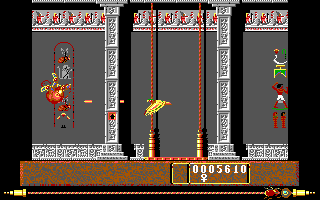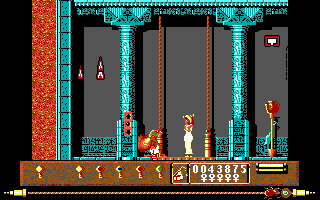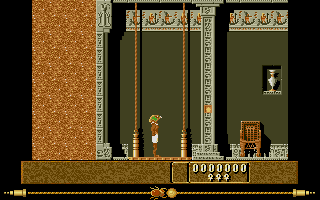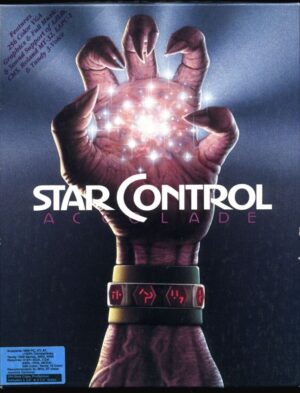Retro Replay Review
Gameplay
Eye of Horus introduces players to a refreshing blend of platforming and puzzle-solving through the avatar of a mystical shaman. The core mechanic revolves around your ability to switch between human and bird forms, triggered simply by pressing the up arrow to transform into a bird and the down arrow to revert back. This seamless shapeshifting not only feels intuitive but also deepens the exploration aspect, as you scout ahead as a bird to uncover hidden pathways and potential traps.
(HEY YOU!! We hope you enjoy! We try not to run ads. So basically, this is a very expensive hobby running this site. Please consider joining us for updates, forums, and more. Network w/ us to make some cash or friends while retro gaming, and you can win some free retro games for posting. Okay, carry on 👍)
Combat is minimalistic yet satisfying, placing the emphasis on timing and agility rather than button-mashing. As a human, you rely on your mystical staff to briefly stun small guardians and disable certain mechanisms. In avian form, direct combat is off the table, but your aerial perspective allows you to spot levers and distant switches that would otherwise remain obscured. This duality ensures that each form plays a vital, complementary role in overcoming the challenges within the pyramid’s depths.
The level design rewards experimentation. Early chambers ease you into basic platforming jumps and trap avoidance, while later stages ramp up complexity with moving platforms, pressure plates, and collapsing floors. Bird mode shines when scouting these intricate rooms, giving you a strategic overview that can mean the difference between life and an untimely demise in a pit of spikes. This dynamic interplay between forms keeps the gameplay loop engaging from start to finish.
Graphics
Visually, Eye of Horus captures the mystique of ancient Egypt with warm sandstone hues, sunlit corridors, and dimly lit chambers filled with hieroglyphic carvings. Each environment feels handcrafted, with detailed textures that bring crumbling pillars and ornate walls to life. The lighting is particularly striking: beams of sunlight pierce through ceiling cracks, casting shifting shadows that heighten the sense of exploration.
The bird transformation introduces an equally appealing aesthetic shift. As your shaman takes flight, feathers glint in the golden light, and the world below blurs slightly—emphasizing speed and motion. This momentary change in palette and perspective is not only a gameplay tool but also a visual treat, reinforcing the magical aspect of your abilities.
Animation quality holds up well, especially during trap encounters. Spinning blades whirr convincingly, and pressure plates depress responsively beneath your weight. The subtle sway of hanging torches and the flutter of your feathers during flight contribute to an immersive experience. Overall, the graphics strike a fine balance between artistic stylization and atmospheric detail.
Story
The narrative in Eye of Horus follows a mystical shaman on a singular quest: to retrieve the legendary Eye of Horus from the heart of an ancient pyramid. Though the premise is straightforward, the game weaves in elements of Egyptian mythology through wall inscriptions and environmental storytelling. Each chamber hints at prior explorers who fell victim to the pyramid’s curses, offering a sense of history and stakes.
Story beats unfold organically between levels rather than through lengthy cutscenes. Discovering a hidden alcove or activating a forgotten mural often triggers a snippet of lore, narrated in brief text accompanied by symbolic artwork. This approach keeps the pacing tight and encourages players to scour every corner for narrative fragments that enrich the world-building.
The shaman’s motivations resonate thanks to subtle touches: a personal grudge against the pyramid’s guardian spirits, and visions of a blighted village that desperately awaits the Eye’s healing power. While the story doesn’t reinvent the wheel, it provides enough emotional investment to make each trap avoided and each puzzle solved feel worthwhile on a personal level.
Overall Experience
Eye of Horus delivers a cohesive package that balances challenge and accessibility. The shapeshifting mechanic remains fresh throughout, fostering a sense of empowerment as you master both forms. Trap difficulty scales gracefully, offering moments of tension without veering into frustration. Checkpoints are generous, ensuring that even repeated failures become learning opportunities rather than aggravations.
Performance is solid across the board, with stable frame rates and quick loading times between levels. Ambient sound design—echoing footsteps in vast chambers, distant drips of water, and ethereal chimes when entering sacred rooms—further immerses you in the pyramid’s depths. A subtle musical score underscores key moments without ever overwhelming the action.
For fans of atmospheric platformers and explorative puzzles, Eye of Horus stands out as a memorable journey into myth and mystery. The game’s relatively moderate length means it never overstays its welcome, and its layered design encourages at least one replay to seek out hidden secrets. Whether you’re drawn to its mystical narrative or its clever mechanics, this adventure provides a satisfying expedition into the heart of ancient Egypt.
 Retro Replay Retro Replay gaming reviews, news, emulation, geek stuff and more!
Retro Replay Retro Replay gaming reviews, news, emulation, geek stuff and more!









Reviews
There are no reviews yet.